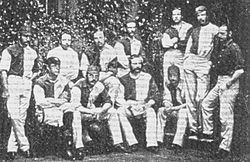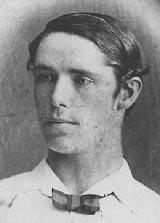 An illustration of the FA Cup trophy awarded in 1874 | |||||||
| Event | 1873–74 FA Cup | ||||||
|---|---|---|---|---|---|---|---|
| |||||||
| Date | 14 March 1874 | ||||||
| Venue | Kennington Oval, London | ||||||
| Referee | Alfred Stair (Upton Park F.C.) | ||||||
| Attendance | 2,000 | ||||||
The 1874 FA Cup final was a football match between Oxford University and Royal Engineers on 14 March 1874 at Kennington Oval in London. It was the third final of the world's oldest football competition, the Football Association Challenge Cup (known in the modern era as the FA Cup). Both teams had previously reached the final but been defeated by Wanderers. The Engineers had reached the final with comparative ease, scoring sixteen goals and conceding only one in the four previous rounds. Oxford's opponents in the earlier rounds had included two-time former winners Wanderers.
Contents
The final was decided by two goals from Oxford in the first twenty minutes. Their opponents had spent two weeks training for the match, an innovative concept at the time, but were repeatedly thwarted by Charles Nepean, the Oxford goalkeeper. The Engineers were said to have missed their best back, Lieut. Alfred Goodwyn, who had been posted overseas.

